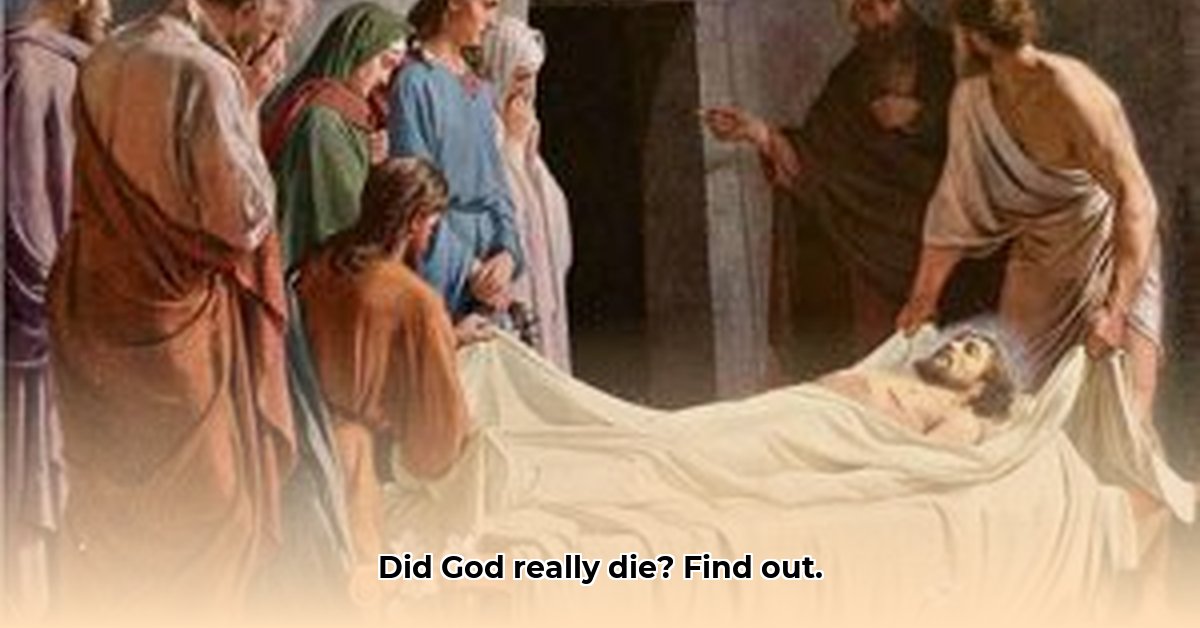# How Did God Die? Understanding Christ's Sacrifice
Ever wrestled with the profound question: "How did God die?" It seems paradoxical, yet it sits at the core of Christian faith. This article delves into the death of Jesus, exploring whether it was merely a significant human event or a pivotal moment with profound implications for God himself. We'll examine diverse interpretations, ranging from straightforward explanations to intricate theological perspectives. We will unpack the concept of the Trinity (God as three distinct persons united in one being) and its relevance to Jesus' sacrifice. Furthermore, we will consider the insights of renowned theologians on this subject. For a deeper understanding of Jesus' role, see this helpful resource: [Jesus, the Word](https://www.lolaapp.com/jesus-is-the-word/). Our aim is to illuminate this intricate puzzle – the death of God and its significance for humanity. Join us on a journey into the heart of Christian belief as we explore this complex concept.
## Exploring the Divine Paradox: The Death of God
The question, "How did God die?", can be startling, challenging our understanding of the divine. It probes the very essence of Christian belief, prompting profound reflection on God's nature. We must grapple with the seemingly impossible: How can a being who is both fully God and fully human, eternal and all-powerful, experience death? This article explores the paradox of mortality, contemplates God's eternal existence, and offers pathways for navigating such complex spiritual inquiries.
### Incarnation: God Becoming Human
Central to Christian theology is the Incarnation – the concept of God becoming human in the person of Jesus Christ. This concept introduces the hypostatic union, the union of divine and human natures in Jesus. Understanding the fusion of seemingly disparate entities presents a considerable intellectual and spiritual challenge. Jesus was not partially human; He was simultaneously fully God and fully human. This mystery, rooted in faith, defies complete explanation yet remains essential to Christian doctrine.
In this context, how does the concept of God dying emerge? Christian understanding posits that it was the *human* aspect of Jesus that endured suffering and ultimately died on the cross. Jesus experienced the spectrum of human emotion, pain, and vulnerability, fully embracing the mortal experience. However, the *divine* aspect of Jesus, the essence of God, remained impervious to death. This paradox enables believers to comprehend the magnitude of God's sacrifice while acknowledging His eternal nature. Scripture affirms that Jesus' human experience did not diminish his divinity.
### Atonement Theories: Diverse Perspectives on Jesus' Sacrifice
The means by which Jesus' death atones for human failings is a subject of extensive debate and theological exploration. Various perspectives exist, often categorized as atonement theories. Some propose that Jesus bore the punishment deserved by humanity, while others emphasize that Jesus' death was a demonstration of God's boundless power and profound love. Still others focus on the way Jesus' death restored the connection between humanity and God. These perspectives offer varying explanations for the profound significance of Jesus' death, each attempting to illuminate the transformative achievement of His sacrifice.
### Theological Semantics: What Does "God Died" Really Mean?
The phrase "God died" carries significant weight and demands careful theological consideration. While it powerfully conveys the immensity of God's love and ultimate sacrifice, literal interpretation can lead to misinterpretations. Some have erroneously inferred that God Himself suffered, a notion at odds with core Christian beliefs. Thus, understanding the context is crucial. A literal interpretation contradicts the Christian understanding of God's eternal nature. The question remains: can the language of faith adequately capture the divine?
### Christ's Death: Addressing Common Misconceptions
It's imperative to clarify that Christian doctrine does not assert the death of Jesus' divine nature. Only Jesus' human aspect experienced death. This distinction is vital for comprehending the essence of Jesus' sacrifice and God's role in human redemption. Christians maintain that God was fully present amidst the suffering. Scripture provides ample support for this view.
### Resurrection: Hope and Transformation
The resurrection of Jesus is inextricably linked to His death. It symbolizes victory over death, demonstrating the supremacy of life over mortality and the omnipotence of God. The resurrection validates the Christian assertion that Jesus' divinity remained unaffected by His death, countering potential misinterpretations. How does the resurrection reinforce Christian tenets?
### The Importance of Precise Terminology
While emotionally resonant, the expression "God died" requires theological precision. It serves as a shorthand for the immense sacrifice made by God but necessitates careful unpacking. By employing precise terminology, we can avoid misinterpretations and more effectively convey the profound spiritual reality. How can we articulate the Christian narrative more effectively?
### A Journey of Faith: Unfolding the Mystery
Ultimately, grappling with the question "How did God die?" invites a deeper immersion into faith, prompting exploration of the Trinity, the Incarnation, and the transformative implications of Jesus' death and resurrection. While no definitive answer exists, the journey of exploration through faith and theological reflection deepens understanding and strengthens conviction. The mystery surrounding the nature of God and the sacrifice of Jesus invites continuous study and contemplation, enriching the spiritual lives of those who seek understanding. How can the Christian narrative be improved?
## Reconciling "God Died" with the Doctrine of the Trinity
**Key Takeaways:**
* The assertion "God died" is a theologically complex statement requiring an understanding of Jesus Christ's dual nature.
* Jesus Christ possessed both a fully divine and a fully human nature, a concept known as the hypostatic union.
* The death on the cross was the death of Jesus' human nature; His divine nature remained eternal and unchanging.
* Reconciling "God died" with the doctrine of the Trinity hinges on understanding this crucial distinction: the event was not the extinction of God but a sacrifice within the Trinity.
* This understanding is critical for comprehending atonement and salvation; misinterpretations can lead to theological errors.
### The Paradox of Divine Suffering
The affirmation that "God died" appears inherently paradoxical. How can the eternal, omnipotent God experience death? This question has stirred theological debate for centuries. The answer is rooted in the doctrines of the Trinity and the hypostatic union. How do we integrate faith and reason?
### The Trinity and Hypostatic Union
Christianity posits that God exists as three co-equal, co-eternal persons: Father, Son, and Holy Spirit. This is the Trinity. Jesus Christ, the Son, is fully God and fully human, a unique union of divine and human natures in one person – the hypostatic union. The Trinity serves as a cornerstone of the faith.
Consider a coin with two inseparable sides. Similarly, Jesus' divine and human natures were perfectly united. The death on the cross affected His human nature, while His divine nature remained untouched.
### Jesus' Human Experience and Historical Context
The death of Jesus was a real, physical event, not merely a metaphor. His suffering affirmed the reality of His humanity. Scripture portrays Jesus fully participating in the human experience, including His death. The historical context is paramount.
This understanding reconciles the seeming contradiction of "God died." God, in the person of Jesus, experienced death in His human nature but not His divine nature. Understanding the distinction between these natures is key. Can we bridge the divide between the earthly and the spiritual?
### Atonement, Salvation, and Divine Love
Within the Trinitarian framework, the death of Christ is central to Christian theology. It forms the basis for atonement – humanity's reconciliation with God – and provides the foundation for salvation. Understanding the nature of Christ's death illuminates God's profound love and sacrifice. What is its relevance today?
Misinterpretations of this doctrine can lead to theological errors. Modalism suggests God is a single being manifesting in different modes, while Nestorianism separates Jesus into two distinct persons. Neither reflects the biblical teaching on Jesus Christ as understood within the Trinity.
### Conclusion: Faith, Reason, and the Mystery of God
The assertion that
Latest posts by Lola Sofia (see all)
















